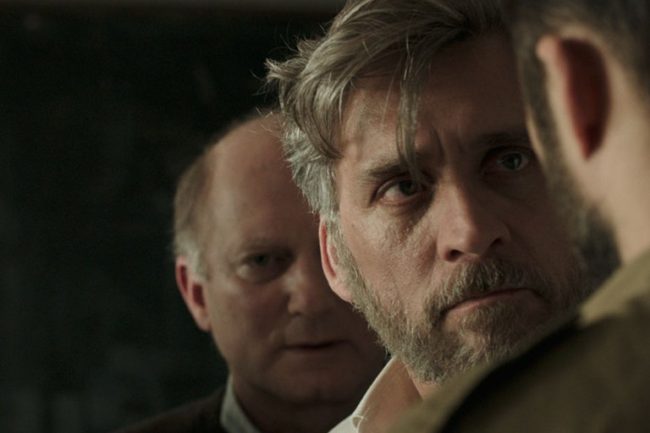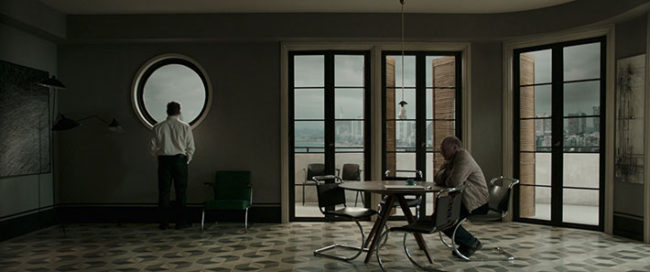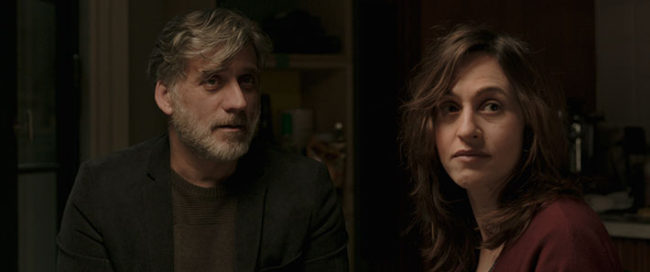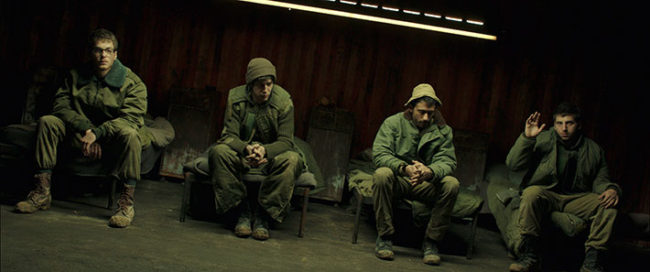GOLDSTONE star Alex Russell and U.S. distributor Arnie Holland will participate in Q&A’s on Saturday, March 10 after the 1:50 PM screening at the Playhouse and the 5 PM show at the Monica Film Center.
SUBMISSION Q&A’s with the Filmmaker Opening Weekend at the Monicas & Playhouse.
SUBMISSION writer-director Richard Levine will participate in Q&A’s following the 7:30 PM screening at the Monica Film Center on Friday, March 9 and after the 7:30 show at the Playhouse on Saturday, March 10.
Sublime Israeli Drama FOXTROT Opens Friday
This Friday we are excited to open Samuel Maoz’s FOXTROT at the Royal in West L.A. Cinephiles in the Valley and and Pasadena area can see the film starting March 9 at the Town Center and Playhouse. A biting social satire in which a troubled family copes with the death of their son at his isolated military post, FOXTROT is the official Oscar submission from Israel that wrecked audiences and earned rave reviews at the Venice, Telluride and Toronto Film Festivals. It won the Grand Jury prize at Venice, as well as eight Ophir Awards including Best Film, Best Director and Best Actor.

American film critics have been universally overwhelmed by the movie. Writing in the L.A. Times, Kenneth Turan said that “no matter what you’re expecting, FOXTROT is not the film you expect it to be. It’s better.” In the New York Times, Manohla Dargis called it “a movie that builds into a devastating indictment of a nation, shock by shock, brutal moment by brutal moment.” Jay Weisberg of Variety was similarly rapturous in his appraisal: “[FOXTROT is] brilliantly constructed with a visual audacity that serves the subject rather than the other way around, this is award-winning filmmaking on a fearless level.” Deborah Young of the Hollywood Reporter called it “bold modernist cinema at its most harrowing.”

When asked about his film, Mr. Moaz shared the following:
“Einstein said that coincidence is God’s way of remaining anonymous. FOXTROT is a dance of a man with his fate. It’s a philosophical parable trying to deconstruct this vague concept called ›fate‹ through a story about father and son. They are far from each other, but despite the distance and the total separation between them they change each other’s fate, and of course their fates. The challenge I set for myself was to deal with the gap between the things we control and those that are beyond our control.

“I chose to build my story as a classic Greek tragedy in which the hero creates his own punishment and fight against anyone who tries to save him. He is obviously unaware of the outcome that his action will bring about.
“On the contrary, he is doing something that seems right and logical to do. And that’s the difference between a casual coincidence and a coincidence that looks like a plan of fate. Chaos is settled. The punishment corresponds to the sin in its exact form. There is something classic and circular in this process. And there is also an irony that is always associated with fate. A structure of a Greek tragedy in three sequences seemed to me like an ideal dramatic platform to deliver my idea.

“I wanted to tell a story that would be relevant to the crooked reality in which I, and we, live. A story with a relevant statement – local and universal. A story about two generations – the second generation of the Holocaust survivors and the third generation – and each of them experienced trauma during his army service. Part of this endless traumatic situation was forced upon us and part of it could have been avoided. A drama about a family that breaks apart and reunites. A conflict between love and guilt; love that copes with extreme emotional pain. And as in my previous film, Lebanon, I wanted to continue to investigate, in an intensive manner that combines criticism and compassion, a human dynamic created in a closed unit. The film has a shot where you see a screen of a laptop with a notice of mourning and next to it a bowl withnoranges. This frame is the story of my country in four words – oranges and dead soldiers.
“When my eldest daughter went to high school, she never woke up on time, and in order not to be late she would ask me to call for a taxi. This habit cost us quite a bit of money, and it seemed to me like a bad education. One morning I got mad and told her to take the bus like everyone else. And if that’s why she’d be late, then she’d be late. Maybe she should learn the hard way to wake up in time. Her bus was line 5. Half an hour after she left, I see in a news site that a terrorist blew himself up in line 5, and that dozens of people were killed. I called her but the cellular operator collapsed because of the unexpected load. Half an hour later, she returned home. She was late for the bus that exploded. She saw him leave the station and took the next bus. And I’m still considered lucky because I have girls …”
Happy New Year! Enjoy the Beginning of 2018 by Seeing All the Shortlisted Foreign Language Oscar Nominees on the Big Screen.

This year intrepid moviegoers will have a chance to see every one of the shortlisted foreign films in theaters. The Academy received submissions from around the world, 92 nations in all, and has whittled them down to these lucky nine. (Anne Thompson of Indiewire has a good breakdown about the snubs and surprises here.)
We open the Hungarian drama ON BODY AND SOUL this Friday at the Music Hall. We’ve been playing the hit Swedish comedy THE SQUARE since November. We have Fatih Akin’s IN THE FADE (Germany), starring a fierce Diane Kruger, right now at the Royal and starting Friday at the Playhouse and Town Center. (We’ll also host Mr. Akin in person for a Q&A at the Royal this Friday.) The following weekend we’ll open THE INSULT (Lebanon), and bring back FELICITE (Senegal) and THE WOUND (South Africa). We’ll have Russia’s LOVELESS in February and Israel’s FOXTROT in early March. We don’t yet have FANTASTIC WOMAN (Chile) dated but most likely will soon. Travel the world via movie theater seat. Much more affordable than the airlines, and better leg room!
IN THE FADE Filmmaker Fatih Akin in Person for a Q&A at the Royal.
IN THE FADE filmmaker Fatih Akin will participate in a Q&A at the Royal after the 7:20 PM screening on Friday, January 5.
Q&A’s for Acclaimed Documentary QUEST this Weekend at the Monicas.
QUEST filmmaker Jon Olshefski will participate in Q&A’s at the Monica Film Center after the 7:20 PM screenings on Friday and Saturday, December 15 and 16, as well as the 2:20 screening on Saturday. L.A. Times film critic Justin Chang will moderate the Friday Q&A and NASHVILLE writer Tim Olshefski will moderate the Saturday Q&A.
THE TRIBES OF PALOS VERDES Filmmaker Q&A’s Opening Weekend.
THE TRIBES OF PALOS VERDES filmmaker Emmett Malloy will participate in Q&A’s at the Royal after the 7:10 PM screenings on Friday and Saturday, December 8 and 9. Ella Taylor of NPR will moderate.
Jewish Journal L.A.: ‘1945’ Examines Postwar Angst in Hungary.
‘1945’ Examines Postwar Angst in Hungary
BY TOM TUGEND | PUBLISHED NOV 17, 2017
An ancient train, belching black smoke, pulls into a station near an unnamed Hungarian village and out step two Orthodox Jews. Not losing a moment, the stationmaster sounds the alarm: “The Yids are coming!”
The year — and the title of the movie — is “1945,” a time when the inhabitants of the village and the rest of their countrymen have arrived at a junction in history and are unsure which path to follow.
While Hungary’s Holocaust-themed movie “Son of Saul” won the Academy Award for foreign-language film two years ago, exhibiting the full horror of the Shoah and its concentration camps, the postwar “1945” probes the potential for greed and selfishness in every human being.
“We are the third postwar generation,” director Ferenc Torok said in a phone interview from Budapest. “And a lot of people are asking what their parents and grandparents did during the world war.”
The film takes place in the middle of summer as the villagers till their fields, smoke and drink endlessly, and prepare for the wedding of the son of a domineering town clerk to a pretty peasant girl. Nazi Germany had surrendered two months earlier, in May, and while some Soviet troops have arrived, the Communist puppet government has not yet assumed power.
The two arriving Jews — the older clad in a black coat and hat and his adult son wearing a workman’s cap and clothing — unload two large trunks and hire a horse-drawn cart and its driver to carry their load for the hour-long trip to the village, while father and son follow behind on foot.
As the odd procession wends its way through the countryside, the stationmaster’s warning stokes the villagers’ fears that the survivors among their former Jewish neighbors now will demand the return of the houses, businesses and furniture they left behind when they were deported to concentration camps. That means the town clerk would no longer own the drug store and his wife could no longer glory in the beautiful rugs, dishes and silver menorah of the previous owner.
In the ensuing panic, some try to hide their ill-gotten gains, while others put their hopes in papers, signed by the pro-Nazi wartime government, “officially” transferring the abandoned homes and goods to the gentile neighbors.
When horse, cart and the “Yids” arrive at the village, women peek through shutters, the pharmacist tries to hide his tubes and bottles. Rumors spread that the trunks contain perfumes and beauty aids to sell to the village women.
Finally, the cart and two men arrive at the gates of the abandoned Jewish cemetery. The younger Jew, with a concentration camp number tattooed on his forearm, takes a key out of his pocket and opens the rusty gate, as a posse of hostile villagers gathers nearby. Inside the cemetery, father and son open the trunks and bury the unexpected contents. In the final scene, the two strangers re-board the train, their mission accomplished.
The result is a masterfully directed, acted and photographed movie, which again disproves predictions that the time of the Holocaust-themed movie has expired, even as the last eyewitnesses are dying.
Torok, who is not Jewish, said that part of the continued interest in a place like Hungary, whose Jewish population was decimated during the war, has to do with the fact that for many years while the nation was a Communist satellite, the subject of the Holocaust — and particularly the participation of many Hungarians in it — was taboo. The same applied to the collaboration of many Hungarians with Hitler’s regime, as German and Hungarian troops fought together in the invasions of Yugoslavia and the Soviet Union.
The film started as a short story by Hungarian Jewish writer Gabor T. Szanto, titled “Homecoming,” which won the Yad Vashem Avner Shalev Prize for best artistic representation of a Holocaust-related topic. Torok, relying on Szanto’s intimate knowledge of Jewish life and rituals, asked him also to write the screenplay.
In a separate phone interview, Szanto, editor of the Hungarian-Jewish magazine “Szombat” (Sabbath), made a number of observations on Hungarian Jewry, past but mostly present.
“The Holocaust is still the cornerstone of our thinking, not only for Hungary’s 80,000 Jews (compared with 450,000 before World War II) but to every other Nazi-occupied nation,” he said. “This film is really Europe’s story.”
In general, Hungarian Jews, like their American counterparts, tend to be liberals and left-leaning and they are concerned by their country’s political shift to the right, Szanto said. Among the worrisome signs is the growing strength of the nationalistic Jobbik party.
Another sign is the recent public poster campaign by the Hungarian government, depicting George Soros, a Hungarian-American and Jewish billionaire and philanthropist, as the mastermind of a massive of influx of illegal immigrants from the Middle East into Hungary.
“As a writer, I am a bit of an outsider and try to look at Hungary and its Jewish community realistically,” Szanto said. “We have many problems, but I don’t think they can be solved by ideologies. We can believe in ideals, but our solutions must be realistic. You can’t change human nature.”
“1945” begins screening on Nov. 25 at Laemmle’s Royal Theatre in West Los Angeles, Playhouse 7 in Pasadena and Town Center in Encino, as well as Westpark 8 in Irvine. On Dec. 8, the film will open at the Laemmle’s Claremont 5 in Claremont.
© Copyright 2017 Tribe Media Corp
- « Previous Page
- 1
- …
- 5
- 6
- 7
- 8
- 9
- …
- 27
- Next Page »
